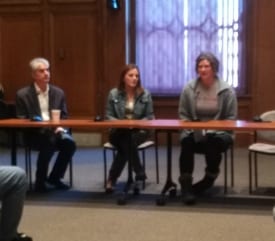
January 11, 2017
CLA participates in effort to fight ‘existing slavery’ in Massachusetts
WORCESTER, Mass.—Community activists and organizations came together Jan. 11 at City Hall to mark the World Day Against Human Trafficking, as well as to draw attention to the issue and how it affects Central Massachusetts.
Human trafficking occurs when someone is held in captivity and forced to perform work – often sexual in nature – against their will for the profit of others. In Worcester and other Massachusetts communities, organizers said, many prostitutes are not working of their own free will, but are victims of trafficking.
In addition to raising awareness, organizers used the event to bring together local organizations to sign on to create an anti-trafficking directory of services to help those who have been affected. Community Legal Aid and its wholly-owned subsidiary, Central West Justice Center, added their names to the resource. The organizations are the sole agencies providing civil legal aid in central and western Massachusetts, and can provide free legal advocacy on issues important to those who have been trafficked, including domestic violence, homeless services, restraining orders, education issues, and, in the case of CWJC, immigration issues.
The Central Massachusetts Coalition to End Human Trafficking and the Worcester Caucus for Women’s Issues sponsored the event. Robin Currie, a member of both groups, began the discussion reflecting on a 500-mile walk she did through each of the New England states (besides Vermont) to raise awareness.
“Slavery exists right now, right in front of us,” Currie said. On her walk, she found that most people did not realize that trafficking is an issue locally, but were eager to engage her, and by the time she reached Connecticut, people recognized her from television and newspaper stories.
Audra, one of two survivors of human trafficking who spoke, said the problem was far more common than people realize. “I walk by the same girls every day on the street,” she said, reflecting on her experience.
Steven Procopio, a lecturer at Boston University and social worker specializing in childhood sexual trauma, noted that, contrary to the stereotype, boys are often victims of sexual trafficking as well: up to 34 percent of all cases. “Boys are pimped, too,” he said.
Almost invariably, Procopio said, victims have some combination of life experiences that have made them vulnerable to traffickers, including such adverse childhood experiences (ACEs) as physical abuse, sexual abuse, and substance abuse.
Worcester City Council member Kate Toomey pointed out that very often exploiters and abusers play on the mental health issues, especially low self esteem, of people, especially youth, in order to prey upon them.
The city would like to do more, said Dr. Matilde Castiel, Worcester’s Director of Health and Human Services, while detailing that the city does offer wraparound services to address mental health issues at a young age.
Also participating in the meeting was Council Member Candy Carlson, Sarah Dunham of the church-based Abolitionist Network, and a host of community and nonprofit organizations from around the area, as well as a representative from Commerce Bank.
Those needing help are urged to call 508-827-1124, a resource line for trafficking victims sponsored by Living in Freedom Together. Anyone needing legal assistance in Central and Western Massachusetts is invited to contact Community Legal Aid.

















































